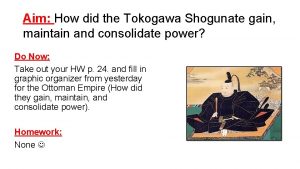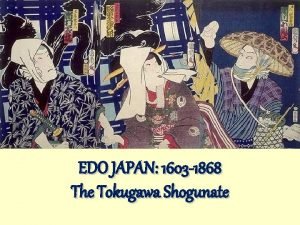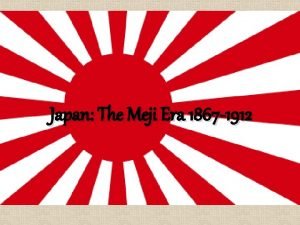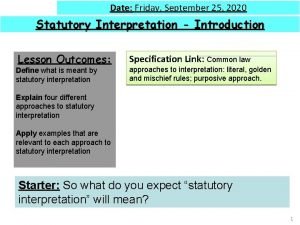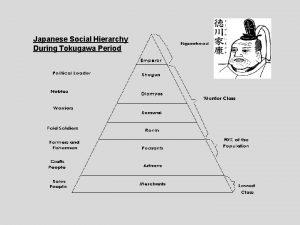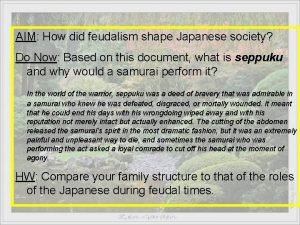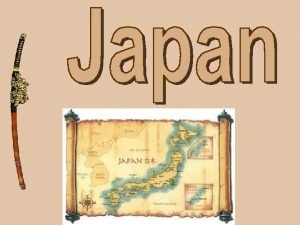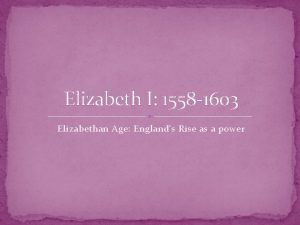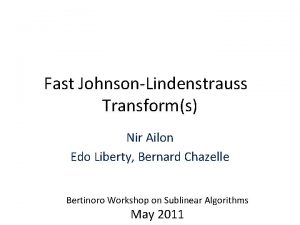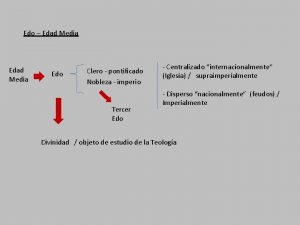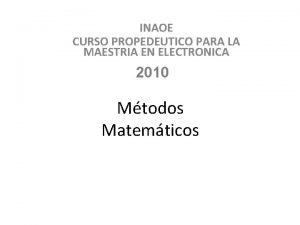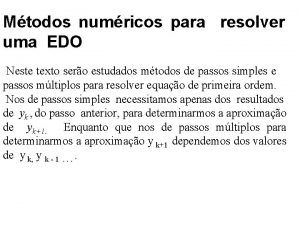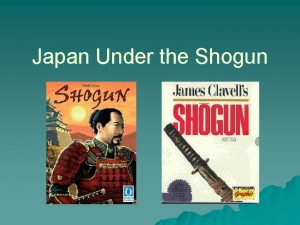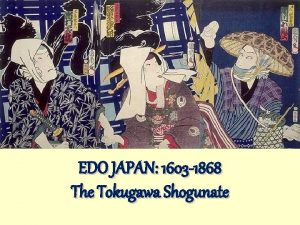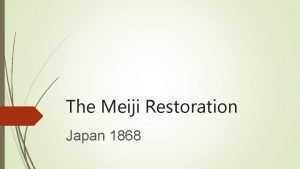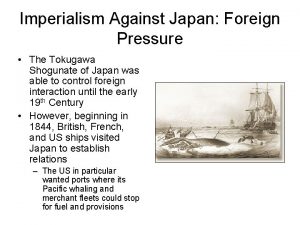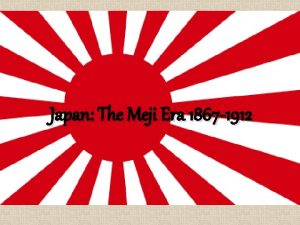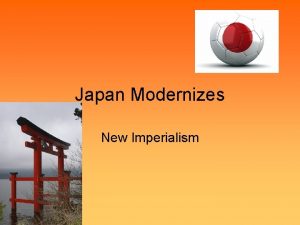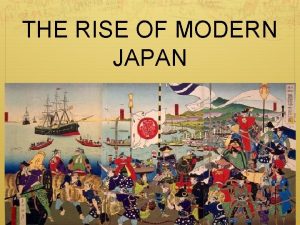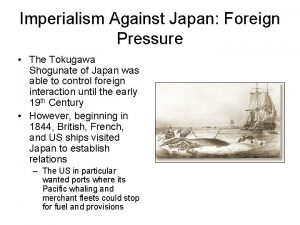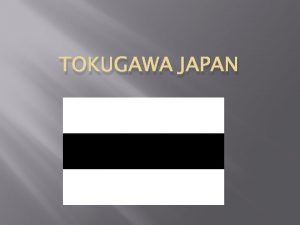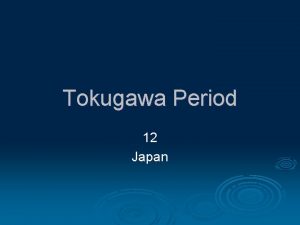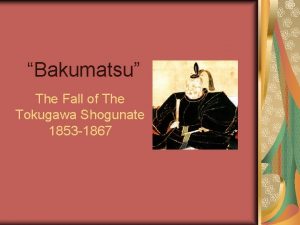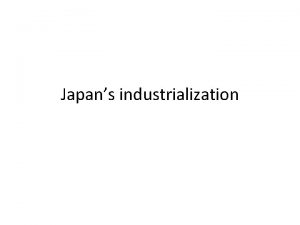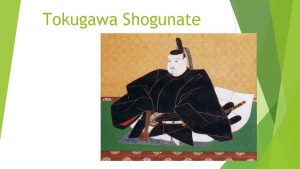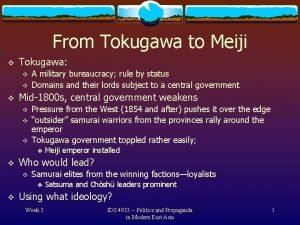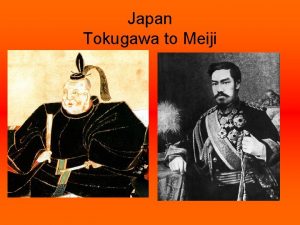EDO JAPAN 1603 1868 The Tokugawa Shogunate The





































- Slides: 37

EDO JAPAN: 1603 -1868 The Tokugawa Shogunate

The emperor reigned, but did not always rule! Feudal Society

Feudalism A political, economic, and social system based on loyalty, the holding of land, and military service. Japan: Shogun Land - Shoen Protection Daimyo Samurai Peasant Loyalty Samurai Peasant Food Peasant

Feudalism A political, economic, and social system based on loyalty, the holding of land, and military service. Europe: King Land - Fief Lord Land - Fief Protection Knight Peasant Loyalty Lord Knight Peasant Loyalty Knight Peasant Food Peasant

Code of Chivalry * Justice * Loyalty * Defense * Courage * Faith * Humility * Nobility

Code of Bushido * Fidelity * Politeness * Virility * Simplicity

Medieval Warriors vs. European knight Samurai Warrior

Medieval Warriors vs. Knight’s Armor Samurai Armor

Zen Buddhism A variation of the Mahayana form of Buddhism, Centered on Meditation It reinforced the Bushido values of mental and self-discipline.

将軍 Shogun : • Literally, “military commander” • De Facto ruler of Japan • Nominally appointed by emperor (emperor is more of a spiritual leader, like the Pope in Europe) Special rights: Controlled the Daimyo with favors and land grants

大名 Daimyō: • powerful landholding elite • Direct control of the land the peasants that lived there

侍 Samurai: • Literally, “one who serves” • 1/15 of the total population • Bound by code of ethics known as bushido Special rights: dai-sho 大小two swords (large and small) kirisute-gomen 切捨て御免right to cut down offending commoners without rebuke seppuku 切腹 right to ritual suicide (self-evisceration)

Farmers & Peasants: • More than 80% of total population • Taxed 40 -50% of the crops they produced. • Forbidden access to all recreation and games other than local festivals. • Required to provide labor for public works upon demand (construction of roads, bridges, etc. )

Townspeople and Merchants: • Lifestyles were strictly governed by laws dictating what they could wear, where they could live, size of home, etc. • At bottom of social hierarchy as in Buddhist China • Major commercial centers emerge. • • Osaka -- sake, soy sauce, cloth, paper, iron. Kyoto - textiles, pottery.

C A S T L E S

Osaka Castle

Matsumoto Castle

Himeji Castle Japan

Caernorfon Castle, Wales

Warwick Castle, England

• 1453 Portuguese traders and Christian missionaries arrive, strengthening ties with the outside world.

Francis Xavier Jesuit missionary Brings Christianity to Japan 1549 17 th century Japanese Bible

Tokugawa Ieyasu Grasps power after a decisive battle at Sekigahara on October 21, 1600. By 1603, Ieyasu is granted the title of shogun by the emperor and establishes the Tokugawa shogunate

Capital city moves to Ieyasu’s domain of Kanto, capital city established at Edo (modern-day Tokyo)

参勤交代 sankin kotai alternate attendance system): policy that required daimyo to divide their time between the capital of their own domain and the shogun's capital city of Edo (Tokyo). Suppressed possibility of rebellion (wives, children of daimyo remain in Edo as hostages) Economic costs of travel on daimyo ensured lack of funds for rebel armies

Sankin kotai (alternate attendance system) 参勤交代

Social Changes • Once Japan was stable, Tokugawa authorities pushed daimyo and samurai to become bureaucrats and government officials. • As they lost their place in society, many of the ruling elite (whose income came from collecting rice from peasants), fell into poverty

• Merchants in Japan became increasingly wealthy and prominent. • Japanese cities flourished. • Rice dealers, pawnbrokers and merchants soon controlled more wealth than the ruling elites.

New social roles for samurai during the great Tokugawa peace • Teachers • Poets, scholars, writers • Buddhist monks • Government posts -- civil administration

The Samurai need something to do and the merchants need to stay out of politics… The Three Entertainments • kabuki • sumo • Yoshiwara pleasure districts

• By the 1580’s about 150, 000 Japanese had converted to Christianity including several powerful daimyo • Tokugawa shoguns restricted European access to Japan for fear Christianity might allow for alliances between daimyo and Europeans. • Resentment by Buddhist monks grows

Anti-Christian Campaign • In 1612, shoguns began rigorous enforcement of decrees putting a halt to Christian missions. • They tortured and executed European missionaries who refused to leave as well as Japanese Christians who refused to abandon their faith. • They often executed victims by crucifixion or burning at the stake.

• Shogun fears that Christian Control of Foreign Relations Europeans might cause serious problems by making alliances with Christian daimyo and supplying them with weapons.

Control of Foreign Relations During the 1630’s, the shoguns: • forbade Japanese from going abroad, • prohibited the construction of large ships, • expelled Europeans from Japan, • prohibited foreign merchants from trading in Japanese ports, • controlled trade with Asian lands, • permitted only small numbers of Chinese and Dutch merchants to trade in Nagasaki ONLY

“Dutch Island” Dutch merchants brought news of European and larger world affairs.

Social and Economic Change • Economy actually improves! • Increased agricultural production • New methods of water control and irrigation • Use of fertilizer increased rice yields • Production of cotton, silk, indigo, and sake increased. • Move from subsistence farming to market production.

 Tokogawa shogunate
Tokogawa shogunate 1868-1603
1868-1603 Tokugawa japan ap world history
Tokugawa japan ap world history Meiji restoration
Meiji restoration Alfred du bois
Alfred du bois R v allen (1872) lr 1 ccr 367
R v allen (1872) lr 1 ccr 367 Hayward earthquake 1868
Hayward earthquake 1868 Calamba cradle of a genius
Calamba cradle of a genius Adler v george 1964
Adler v george 1964 Tokugawa social hierarchy
Tokugawa social hierarchy The tokugawa shoguns created an orderly society by
The tokugawa shoguns created an orderly society by Emperor shogun daimyo samurai peasants
Emperor shogun daimyo samurai peasants Japanese feudal system
Japanese feudal system 1603 anglie
1603 anglie Apothecary elizabethan era
Apothecary elizabethan era 1603-1485
1603-1485 Velk�� brit��nie pr��ce
Velk�� brit��nie pr��ce Kaspersky 1603
Kaspersky 1603 Error 1603 kaspersky
Error 1603 kaspersky What happened in 1603 shakespeare
What happened in 1603 shakespeare 1603 anglie
1603 anglie Historical background of elizabethan age
Historical background of elizabethan age 1603 in inglese
1603 in inglese 1558 1603
1558 1603 Equação diferencial
Equação diferencial Edo liberty
Edo liberty Edo
Edo Caso especial
Caso especial Edo
Edo Edo period technology
Edo period technology O que é uma locução verbal
O que é uma locução verbal Javier edo meseguer
Javier edo meseguer Edo psych
Edo psych Edo
Edo Equação diferencial linear
Equação diferencial linear Edo ergo sum
Edo ergo sum Edo ergo sum
Edo ergo sum Il diario di edo
Il diario di edo
